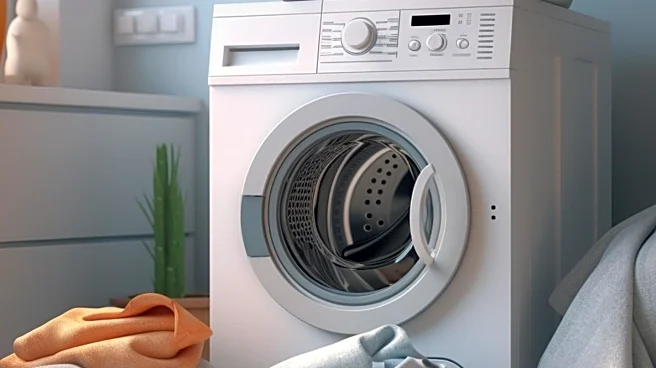What's Happening?
Consumer Reports has provided a series of recommendations aimed at reducing the cost and environmental impact of doing laundry. Rich Handel, a laundry expert from Consumer Reports, suggests using high-performing detergents, such as Tide Plus Ultra Stain Release for tough stains, and Costco's Kirkland Signature Detergent for everyday use, to save money. He advises against using fabric softeners and dryer sheets due to their potential to leave residues on clothes and reduce towel absorbency. Additionally, Handel recommends using cold water for washing, as it accounts for 90% of a washer's energy use, and opting for automatic cycle settings on dryers. For those purchasing new appliances, LG's washer and dryer models, WM4000HWA and DLEX4000W, are noted for their efficiency. Regular cleaning of the dryer's lint filter is also emphasized to improve drying efficiency and reduce energy bills.
Why It's Important?
The advice from Consumer Reports is significant as it addresses both economic and environmental concerns associated with laundry practices. By reducing energy consumption and avoiding unnecessary products like fabric softeners, consumers can lower their utility bills and minimize their environmental footprint. The emphasis on efficient appliances and practices aligns with broader trends towards sustainability and cost-effectiveness in household management. This guidance is particularly relevant for households looking to manage expenses amid rising utility costs and for those interested in adopting more eco-friendly practices.
What's Next?
Consumers may begin to adopt these practices, leading to potential shifts in purchasing behavior towards more efficient appliances and detergents. Retailers and manufacturers might respond by promoting energy-efficient products and eco-friendly alternatives to traditional laundry aids. Additionally, there could be increased consumer awareness and demand for products that align with these cost-saving and environmentally conscious recommendations.
Beyond the Headlines
The recommendations from Consumer Reports could influence broader cultural shifts towards sustainability in household management. As consumers become more aware of the environmental impact of everyday activities, there may be a growing demand for transparency and accountability from manufacturers regarding the environmental footprint of their products. This could lead to innovations in product design and marketing strategies that emphasize sustainability.









